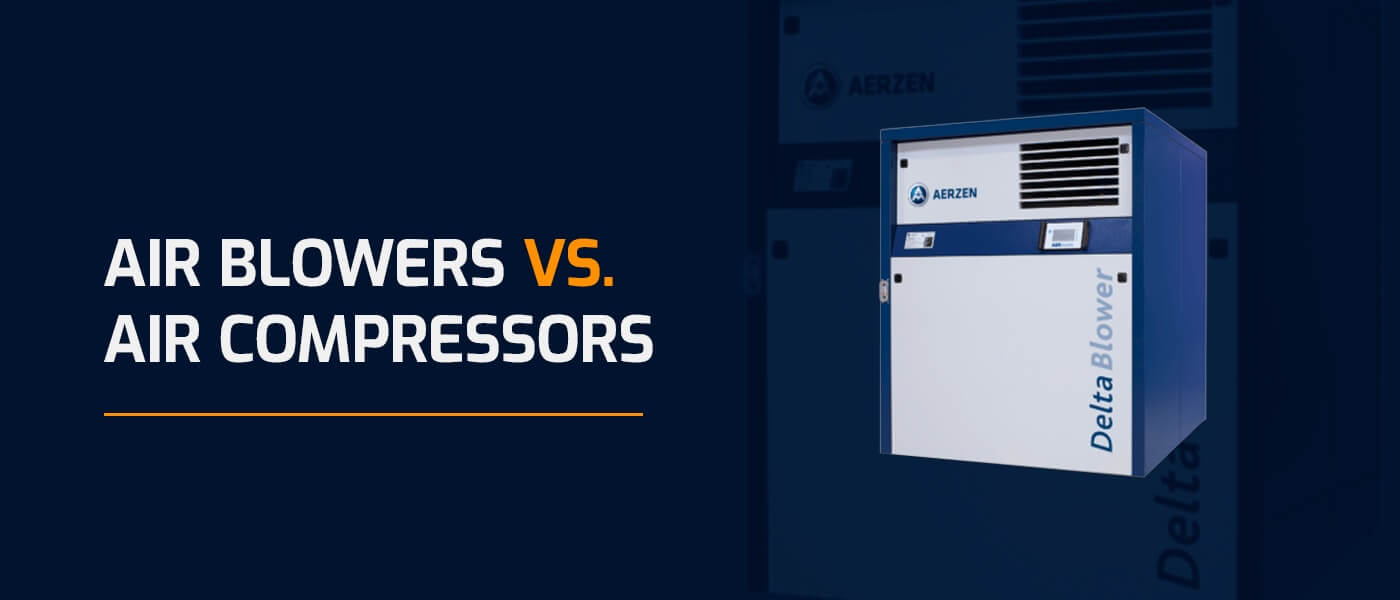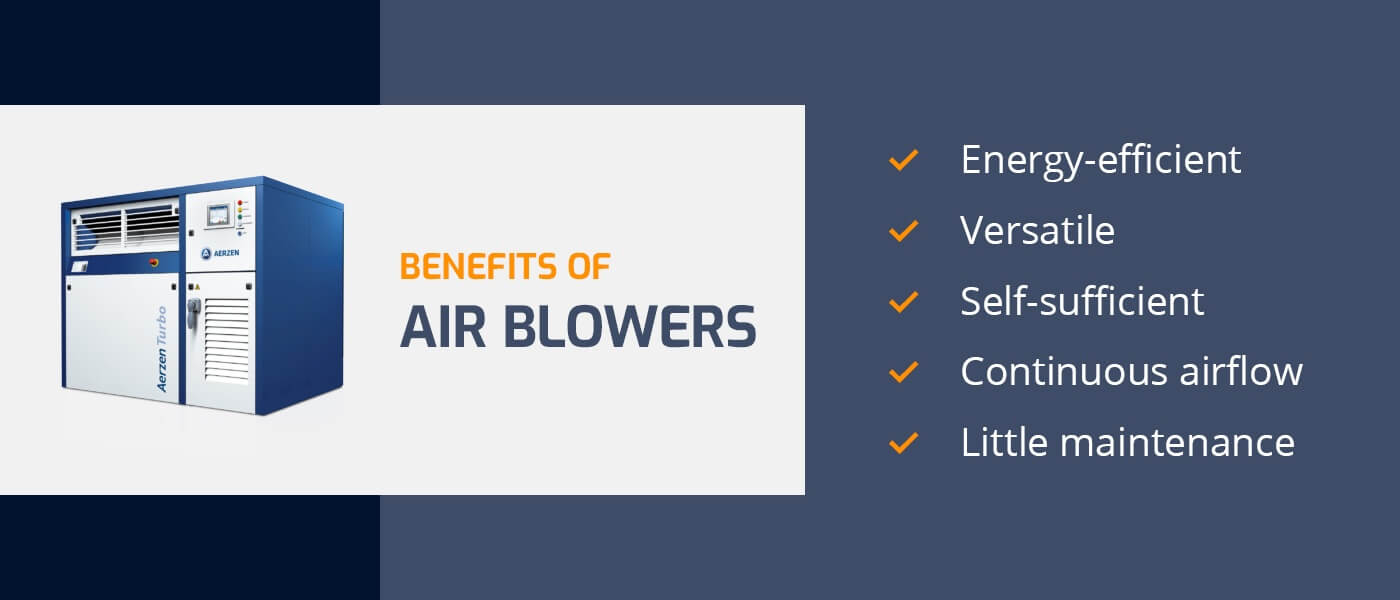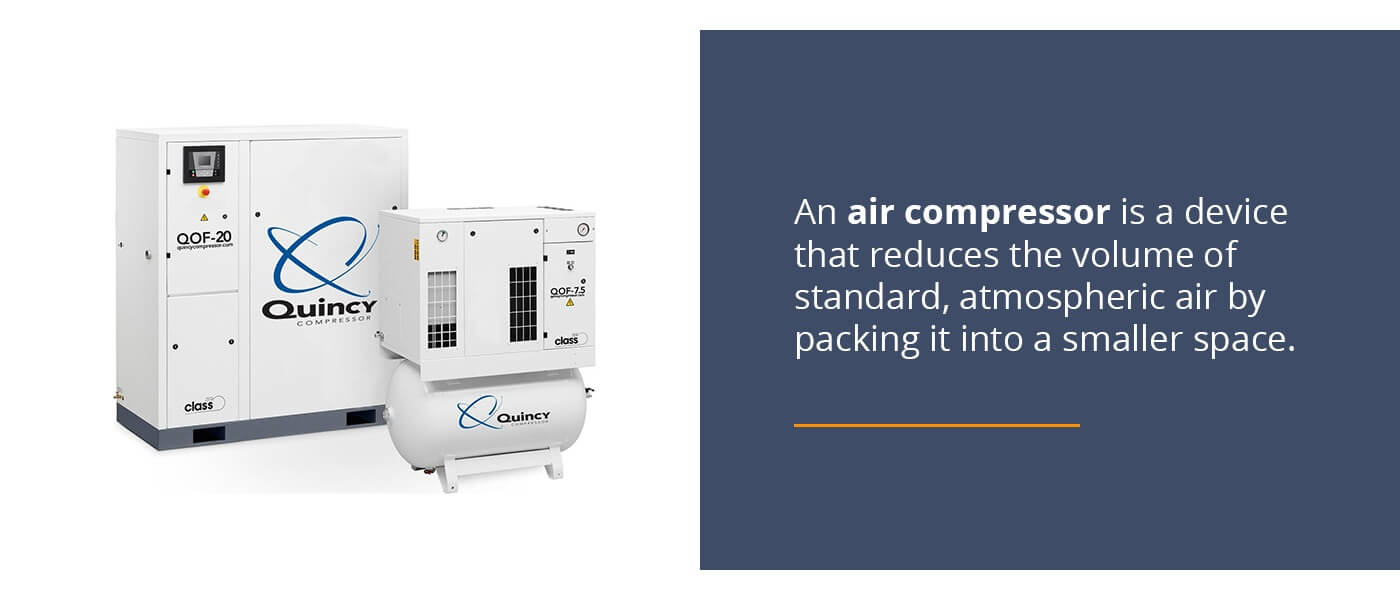April 30, 2021
Air Blowers vs. Air Compressors
SHARE THIS POST

Industries across the world need air for various applications and essential processes. Since the invention of compressed air in 1799 by Englishman George Medhurst, production and manufacturing processes have become more reliable, safe, energy-efficient, and dynamic as a result. We have lessened our economic impact significantly and created safer work environments for employees — all with the power of air.
Air blowers and air compressors both create air streams that can be used for a number of different jobs. Each machine accomplishes this in an entirely different manner, and produces different results; so you must ensure the machines are suitable for the job.
How Industrial Jobs Use Air
Various industrial jobs use air to streamline their manufacturing processes and produce industrial and consumer goods more efficiently. The movement of air is an integral part of production. Many manufacturers rely on compressed air solutions throughout various stages of the process — from the initial transportation of raw materials to the creating, storing, and shipping of finished products.
Ensure you have the best solutions for the job when you use the correct machines to move air. Consider the three fundamental principles during the application of any industrial air-moving device. Determine what device works best for your needs based on the differences in flow, velocity and pressure:
- Flow: Generally measured in volume per unit of time, flow is the measure of air output.
- Velocity: Generally measured in distance per unit of time, velocity is how fast the air is moving.
- Pressure: Generally measured in pounds per square inch (PSI) or bar, pressure is the force applied to an area.
The Difference Between Air Compressors and Air Blowers
The main difference between an air compressor and an air blower is the pressure ratio, determined from the outlet pressure divided by the inlet pressure.
Air compressors pack air into a small space, making the trapped air denser and operate at a high pressure-to-volume ratio. When in use, air compressors release that highly pressurized air into a steady stream.
Air blowers continuously move large quantities of air for a moderate increase of pressure, meaning air blowers operate at a lower pressure-to-volume ratio.
Both devices are versatile as manufacturers use them for different kinds of tasks on a job site. While some of these devices may even look similar to one another, air compressors and air blowers serve vastly different functions. There’s little overlap in the types of industrial jobs they handle best.
What Is an Air Blower?
Air blowers are machines that move large volumes of air for a moderate increase of pressure. Industrial blowers operate at a lower pressure-to-volume ratio than air compressors, making them more ideal for continuous and unsupervised use.
While air blowers can be classified as either centrifugal or positive displacement, all models work similarly to move low-pressure, high-volume air reliably. As the rotators, fan blades, or impellers turn, the air is sucked into the device’s suction side, pressurized, and released in a high-speed stream.
The air volume inside centrifugal blowers will remain constant as air is displaced from one end of the machine to the other. Alternatively, industrial blowers that use positive displacement accelerate the air outwards as the impeller rotates, using centrifugal force with pressure and flow rate as dependent variables.
To find the right type of industrial blower for your industry needs and purposes, you must understand their inner workings, functions, and benefits.
Benefits of Air Blowers

Because industrial air blowers operate at a low-pressure ratio, they offer industries many unique benefits:
- Energy-efficient: Particularly known for their energy efficiency, air blowers are a cost-effective choice for prolonged use.
- Versatile: Air blowers are useful and highly effective for various functions, making them a versatile option for many industries.
- Self-sufficient: This equipment can run without the need for human supervision or regular monitoring.
- Continuous airflow: Air blowers are made to move large quantities of air continuously and can be left running unsupervised for a lengthy amount of time.
- Little maintenance: These machines require relatively little maintenance compared to systems that require oil or water to operate.
Air Blower Uses
Industries that require continuous airflow or a high-velocity air stream should use an air blower to enhance their manufacturing processes. Air blowers are extremely useful in various applications, including:
- Heating and cooling
- Ventilating
- Cleaning and removing debris
- Regulating and eliminating moisture
- Aspirating
- Exhausting
- Mixing
- Inflating
- Transporting
- Conveying
- Drying
Various industries are adopting new ways to use the air created from air blowers, making them highly versatile. For example, the food and beverage industry has found multiple uses for air blowers — from drying bottles and cans before labeling to decontaminating meat, dairy products, fruits, vegetables, and more during the manufacturing process. Air blowers can eliminate all moisture and oil contamination, preventing spoiled goods and promoting a healthy environment.
Locations like cement plants and woodworking shops also find various uses throughout their operations for air blowers. Other specific industrial jobs and their uses for air blowers include:
- Water damage restoration
- Wastewater treatment
- Room pressurization
- Equipment or product cooling
- Fume removal in coal mines and paint shops
- Removal of welding smoke and fumes
- Sterilization of research environments
- Chemical processing operations and petroleum refining
- Food processing and decontamination
- Regulation of objects in production assembly lines
- Pneumatic conveying
- Plastics process cooling
- Ink drying in printing rooms
What Is an Air Compressor?

An air compressor is a machine that reduces the volume of standard, atmospheric air by packing it into a smaller space. The compacted air is stored inside a pressurized chamber until the user decides to eject a focused airstream. Compressed air systems operate at a high pressure-to-volume ratio — ideal for manufacturing processes that need user-controlled airflow and intermittent bursts of high-pressure air.
Similar to air blowers, there are two major classifications for air compressors and how they operate:
- Positive displacement is when pistons or screws decrease the volume of air in a chamber. Rotary screw air compressors use positive displacement to convert power — typically supplied by electric motors, gasoline engines, or diesel engines — into pressurized air.
- Dynamic displacement is where the air in a chamber is accelerated and decelerated by centrifugal force. Centrifugal air compressors tend to be used for larger applications to take air from the atmosphere and compress it with an impeller and a diffuser. They run at higher speeds than centrifugal blowers to create more significant pressure rises.
Benefits of Air Compressors
Due to their high-pressure ratio, air compressors provide the following distinct benefits so businesses can reliably meet their equipment needs:
- Adaptability to working conditions: Get either fixed or variable volumes of compressed air to meet various equipment needs and industrial uses with an air compressor. Many air compressors have flexible control options that can be adjusted as needed, or automatically adjust. They are also extremely adaptable to different environmental conditions with offerings that can operate successfully in higher temperatures, humidity levels, and extreme weather conditions.
- Controlled airflow: Airflow can be manually directed or aimed, giving the user control in various situations. Use concentrated bursts to power specific equipment or target specific areas for cleaning.
- Oil and oil-free options: Oil is used in many models to cool or seal their pressurized chambers. If tiny droplets of oil escape with the released air, this can be problematic for some applications. Oil-free air compressors provide a safe alternative at the compromise of a shorter lasting time.
- Energy Efficiency: The electric costs to operate an air compressor over time can be quite high. Many compressor brands offer extremely energy-efficient rotary screw units with variable speed drives that can significantly decrease energy usage.
Air Compressor Uses
Industries that need high-pressure, low-volume air use air compressors to get the job done. Air compressors are intended for applications that require intermittent, concentrated bursts.
Air compressors are ideal for the following applications and others:
- Powering pneumatic tools
- Powering packing equipment and conveyors
- Blowing dirt, dust, and debris from a workstation
- Powering air cylinders and equipment for automation
- Filling tires
- Removing and replacing bolts
- Sandblasting
- Paint spraying
- Etc.
The most common industrial use for an air compressor is providing power to various items, like tools, controls, actuators and other automated equipment, in place of electricity.
Industries that use air compressors for any number of above reasons include:
- Water management
- Construction
- Manufacturing
- Agriculture
- Automation
- Petroleum and other energy sectors
- Heating, ventilation, and air conditioning (HVAC)
- Chemicals for use in labs and research
- Food and beverage
- Textiles
- Lumber and wood
- Pulp and paper
- Rubber and plastics
- Metals fabrication
- Stone, clay, and glass
- Etc.
Whether you need an air blower or an air compressor depends entirely on your industry, the application, and your desired outcome. Choose with these factors in mind for the most efficient use of air.
Partner With C.H. Reed for All Air Solutions
C.H. Reed’s wide variety of equipment, capabilities, and expertise will ensure you receive the best air blower or air compressor for the job. Whatever industry you’re in, C.H. Reed tailors impactful solutions for compressed air systems and industrial blowers of all sizes. We focus on you to ensure a sustainable solution that meets and exceeds your needs.
For further information on how our air blowers and air compressors can add value to your industry, contact us today.
Search
Categories
Get a consultation
Related Posts
The 3 Distinct Advantages of Hydraulic Powered Pumps
Recently, C. H. Reed helped a major printing operation install a new ink pumping system. The new system needed to transfer four colors of high viscosity, heat-set ink to their three presses, drawing the ink from multiple 5,000…
Simple Ways to Reduce Waste in Your Spray Finishing System
In today’s demanding manufacturing landscape, it can be convenient to adopt a “cut-costs-at-all-costs” mentality, justifying questionable means for the sake of leaner production, a lower bottom line and increased profitability. Regrettably, those efforts can interfere…
What You Need to Know About Air-Powered Pressure Washers
Pressure washers are great solutions for your average cleaning applications, but what tool do you turn to for your more challenging applications? There are many instances where it is simply impossible to use a traditional…